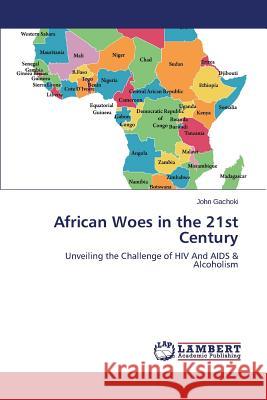African Woes in the 21st Century » książka
African Woes in the 21st Century
ISBN-13: 9783659801112 / Angielski / Miękka / 2015 / 140 str.
In this book, "African Woes in the Twenty-First Century," Dr. John Mararo Gachoki explores the cutting-edge issues in the African context. He specifically cites Alcoholism, and HIV & AIDS as twin issues that must be sorted out as a matter of urgency. If Africa is to realize Sustainable Livelihood Goals (SLGs), it must address this test. In a sense, the Millennium Development Goals (MDGs) were critical benchmarks not only for Africa but also the world at large. Nevertheless, SLGs will not make a real impact in Africa unless it addresses reckless alcoholism, which indeed, increases the prevalence of HIV and AIDS. And as a long serving Administrative Secretary in the Anglican See of Kirinyaga, and a long serving educationist in the republic of Kenya, Mararo wa Gachoki draws his examples from his own context, and goes on to demonstrate that the same rhythmic pattern is prevalent in the rest of Africa. In other words, Gachoki is at pains to explain the challenges that obtains to date and the risk they pose for the future of Africa. The book is a necessary reading for theologians, policymakers, sociologists, anthropologists, and all Africanist scholars around the globe.
In this book, "African Woes in the Twenty-First Century", Dr. John Mararo Gachoki explores the cutting-edge issues in the African context. He specifically cites Alcoholism, and HIV & AIDS as twin issues that must be sorted out as a matter of urgency. If Africa is to realize Sustainable Livelihood Goals (SLGs), it must address this test. In a sense, the Millennium Development Goals (MDGs) were critical benchmarks not only for Africa but also the world at large. Nevertheless, SLGs will not make a real impact in Africa unless it addresses reckless alcoholism, which indeed, increases the prevalence of HIV and AIDS. And as a long serving Administrative Secretary in the Anglican See of Kirinyaga, and a long serving educationist in the republic of Kenya, Mararo wa Gachoki draws his examples from his own context, and goes on to demonstrate that the same rhythmic pattern is prevalent in the rest of Africa. In other words, Gachoki is at pains to explain the challenges that obtains to date and the risk they pose for the future of Africa. The book is a necessary reading for theologians, policymakers, sociologists, anthropologists, and all Africanist scholars around the globe.











